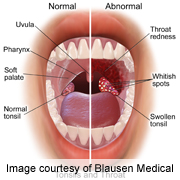- 8 Ways to Increase Dopamine Naturally
- 7 Best Breads for Maintaining Stable Blood Sugar
- Gelatin vs. Collagen: Which is Best for Skin, Nails, and Joints?
- The Long-Term Effects of Daily Turmeric Supplements on Liver Health
- Could Your Grocery Store Meat Be Causing Recurring UTIs?
- Are You Making This Expensive Thermostat Error This Winter?
- Recognizing the Signs of Hypothyroidism
- 10 Strategies to Overcome Insomnia
- Could Artificial Sweeteners Be Aging the Brain Faster?
- Techniques for Soothing Your Nervous System
Advanced Tonsil Cancer May Respond Well to Targeted Radiation


Targeted radiation therapy benefits people with advanced tonsil cancer, a new study suggests.
Such a treatment would effectively fight the disease while limiting the body’s exposure to harmful side effects.
Researchers looked at outcomes for 46 patients with advanced tonsil cancer who were treated at Washington University in St. Louis between 1997 and 2012. The patients were followed between three months and nearly nine years, with an average follow-up of nearly three years.
Limiting radiation treatment to lymph nodes on one side of the neck led to good local control of cancer and no cancer recurrence on the untreated side, according to the study being presented this week at the Multidisciplinary Head and Neck Cancer Symposium in Scottsdale, Ariz.
Lymph nodes are small structures that work as filters for harmful substances in the body, according to the American Cancer Society.
The new study also found that the location of the original tumor, rather than the amount of cancer in lymph nodes on the side of the neck with the tumor, affected the risk of cancer on the other side of the neck.
“All treatments for cancer — surgery, radiation therapy, chemotherapy — although effective, can cause temporary and/or permanent toxicity which can affect long-term quality of life,” study author Dr. Wade Thorstad, chief of head and neck services at Washington University School of Medicine, said in a symposium news release.
“Our research indicates that for appropriately selected patients with tonsil cancer, the volume of radiation therapy necessary to control the cancer can be significantly reduced, therefore reducing the side effects and toxicity of radiation, while maintaining a high rate of tumor control,” said Thorstad, who’s also an associate professor of radiation oncology.
Because this study was presented at a medical meeting, the data and conclusions should be viewed as preliminary until published in a peer-reviewed journal.
More information
Cancer Research UK has more about tonsil cancer.
Source: HealthDay
Copyright © 2026 HealthDay. All rights reserved.










